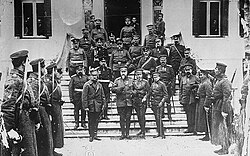
Back التحالف المزدوج (1879) Arabic İkili ittifaq Azerbaijani Аўстра-германскі дагавор Byelorussian Двоен съюз Bulgarian Dvojni savez (1879) BS Doble Aliança Catalan Zweibund German Διπλή Συμμαχία (1879) Greek Duopa Alianco Esperanto Doble Alianza Spanish
This article possibly contains original research. (November 2023) |

The Dual Alliance (German: Zweibund, Hungarian: Kettős Szövetség) was a defensive alliance between Germany and Austria-Hungary, which was created by treaty on October 7, 1879, as part of Germany's Otto von Bismarck's system of alliances to prevent or limit war.[1] The two powers promised each other support in case of attack by Russia. Also, each state promised benevolent neutrality to the other if one of them was attacked by another European power (generally taken to be France, even more so after the Franco-Russian Alliance of 1894). Bismarck saw the alliance as a way to prevent the isolation of the German Empire, which had just been founded a few years before, and to preserve peace, as Russia would not wage war against both empires.[2][3]
| Events leading to World War I |
|---|
 |
|
- ^ Rene Albrecht Carrie, A Diplomatic History of Europe Since the Congress of Vienna (1958) pp. 177–179.
- ^ Roland G. Usher, "Austro-German Relations Since 1866." American Historical Review 23.3 (1918): 577–595 online.
- ^ Christopher Andrew, "German world policy and the reshaping of the dual alliance." Journal of Contemporary History 1.3 (1966): 137–151 online.